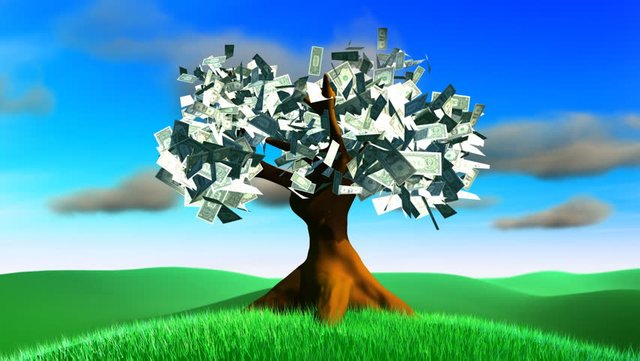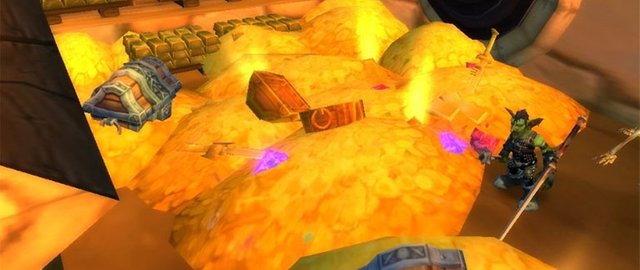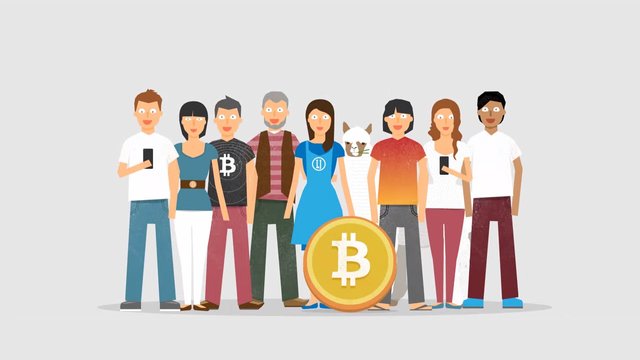Steem: Where DOES the money come from?
And the Answer To the Money Question Is...

So the natural inclination of those who visit Steem is to wonder who's giving out the money? Is this monopoly money? How does this all work? Many are naturally skeptical. Some may just dip their toes in the water. Others might dive in and ask questions later. Whatever the case, almost everyone probably wants a better idea about the theory behind Steem dollars, so here is a brief explanation:
A blockchain-based software network creates Steem dollars, to be used as currency, from loans on the value of Steem digital assets. Steem digital assets represent the ownership of this software network and have value because they're useful and they are scarce.

In general digital assets can be used as money, act like company shares or be used to access specific digital resources. The more people use any particular digital asset, the more they are worth. The estimated value for various digital assets can be found on the website Coinmarketcap.com. The website lists digital assets that are collectively valued at over $12 billion and growing and many of these digital assets like Bitcoin have value because they are both useful and scarce. The question just becomes how useful and valuable are each of these assets? Most people have a hard time understanding how something digital can have that much value. Isn't software easy to copy, corrupt or hack?

Digital Value? Beginning of Virtual Economies.
In the last decade, multi-player video games with virtual economies have demonstrated that digital goods have real world value. Some may treat video game items like collectible baseball cards. Others may find video game items useful to improve their virtual lives and satisfy a material, emotional or psychological need. Scarce items such as powerful weapons in a medieval fantasy game called Diablo or gold in World of Warcraft can take hours to find, earn or accumulate so they become valuable. In fact a game item in Diablo 3 sold for as much as $16,000. Many people have bought and sold virtual gold and other game items on World of Warcraft for dollars or exchanged them for real world goods. In the game Second Life, users create virtual characters, live in a virtual world and buy things like virtual real estate. Linden dollars, the virtual currency used in the game Second Life, are also traded for real dollars. One estimate of the secondary market of real money changing for digital goods was $2 Billion as early as 2007. This was just the beginning of virtual economies.

Is it Secure and Who Owns It? From Video Games to Bitcoin in the Real World.
The establishment of Bitcoin followed an independent path from the video game industry, but the value of virtual items and currencies had already been demonstrated. However with video games, game creators ultimately controlled the supply of these digital assets. If a system were to be created for the public, the control of the system would have to be more decentralized. There were also some key technological issues that had to be addressed to create digital money & asset systems that are secure & decentralized enough for broad public use as explained here: “Bitcoin: What Took Ye So Long? Bitcoin became the first real world experiment with blockchain-based money. Ever since the Bitcoin currency started in 2009 with unknown speculative value, it's since grown in value from millions to hundreds of millions and is currently estimated to be worth over $10+ billion. As mentioned earlier Bitcoin and alternative digital assets in total are estimated to be around $12+ billion. All this value is stored digitally on a network of computers using software. No banks or institutions are required! Today Bitcoin and other digital asset systems are practically impossible to hack or corrupt because they use advanced consensus mechanisms and military-grade cryptography.

Isn't Software Easy to Copy? Intangible Value
Digital assets are easy to copy or replicate. The same goes with software platforms. However, most of the value of Silicon Valley tech giants are intangible and rooted in the network effect. The more people that use a system the more valuable it becomes, and value increases exponentially for every new user that is added. Take Facebook or Twitter for example. The cost to develop the core software for each platform is probably in the millions using the latest technology. More than likely Facebook & Twitter can be built with hundreds of thousands of dollars and really crude versions can be built for tens of thousands. Many software developers can build a lot more for less because of the advancements in software technology, tools and open-source libraries. But even if a technological product were easy to replicate, would you expect copycats to be worth $330 Billion like Facebook is now or $10 Billion like Twitter? The brand, network effect and the psychological attachment people have to a particular product are all huge competitive advantages. Those are the same reasons that Bitcoin and other digital assets maintain value even when the technology is easy to replicate.

Furthermore creating sustainable business value is not just about the product. Just because you can cook a tasty burger doesn't mean you can create a business and take over McDonalds in a few years. If you can mix up a nice combination of soda ingredients it doesn't mean you'll dominate over Coca-Cola. McDonalds has been around since the 1940's and is currently valued at over $100 Billion and Coca-Cola started in the 1880's and is now valued at over $200 Billion.

Digital Assets – Money? Commodities? Stocks?
Money is what something is used for, not what something is - Daniel Larimer
Sea shells, beads, cows, real estate, tobacco, gold and silver all have been used as money at some time or another. The definition of money is subjective, but various commodities or assets have been used as money at different times in history, and in different situations and geographies. We have 180 government or bank issued currencies being used today. Some commodities or assets have better characteristics as a medium of exchange, store of value or unit of account, but any community or ecosystem can ultimately choose what they want to use as money.
Some of these new digital assets like Bitcoin can be seen as monetary commodity assets. Other digital assets are required to access or use a system's resources. For example, Ether is required to execute smart contracts on the Ethereum network and Safecoins are used to access storage on the Maidesafe network. Some digital assets are similar to company shares such as the DAO or Bitshares.

Digital Assets & Money in the Steem Ecosystem
The Steem system is built on secure blockchain software that run on computers. There are three types of assets in the Steem ecosystem. Both Steem and Steem Power are analogous to company shares. A third asset, Steem dollars, are created as a loan on Steem collateral and issued to contributers to the ecosystem as currency.
Steem
Steem is similar to publicly traded company shares. The amount of Steem doubles each year so there is signficant dilution for those that hold Steem, however like many fast growing startups a rapid increase in value may outpace the dilution. Just like company shares (ie. stocks) these digital assets have value as more people use and contribute to the ecosystem. The estimated value of the total outstanding Steem assets is currently about $20 million on Coinmarketcap.com.
Steem Power
Steem Power is similar to private restricted company shares and have disadvantages and advantages. One disadvantage is that holders can't sell Steem Power immediately; hence they are illiquid. The advantages of Steem Power is that holders:
- May earn more Steem and Steem dollars as dividends to offset any dilution
- Have voting power to determine the value of each post.
Steem Dollars
Steem dollars are assets that are created from loans using Steem/Steem power as collateral. If the Steem ecosystem is worth $20 million, the Steem software can create one million in dollars as a loan on the network and issue it as currency for circulation. It's the same as if you owned Apple stock shares worth $500,000 and created a $25,000 loan on your shares and used that as money. You can use similar mechanics with real estate. In fact commercial banks create money this way. Just think about home equity loans and then think about regular home loans and how banks use real estate as collateral to create fiat money.
The blockchain software network executes the entire loan process & interest provisions for Steem dollars and the issuance & allocation of new Steem/Steem power.
Conclusion:
A blockchain-based software network creates Steem Dollars, to be used as a currency, from loans on Steem digital assets. Steem digital assets have value because they're useful to a growing Steemit community and are scarce.
Remember we're still in the early stages of this digital economic evolution and much of this is experimental so it's good to keep your expectations measured. That said, might as well jump in and write about your interests, have fun and enjoy the ride!
Thanks for a good post.
But isn't it possible that steem dollars can "go bankrupt" if the value of the assets drop by 95% or more? In a normal market it would be a total fluke event. But in cryptos extreme moves are much more common.
how to cash your steemit money?
I will keep these articles updated in my websites:
How to withdraw the money you earn at Steemit into USD in your PayPal or bank card?
The Tools I Am Using to Withdraw Steemit Money into PayPal
How to Buy Bitcoin via PayPal?
THANK YOU FOR YOUR VALUABLE INFORMATION!
@feildsofgold
Hey thanks! As the market value goes below a certain point less Steem dollars are created. Currently there is only $3million in Steem dollars out of $465million in value so that's less than 1% so it would have to go down 99%! Also even if that were to go down that much you get a certain amount of Steem collateral that may be temporarily worth less, but you'll still have something. Just like if you backed money with real estate the real estate value may go down and you may end up getting the real estate collateral instead of money. Eventually the real estate may be worth more.
Thanks for such a informative post...
For Steem to really take off it just needs to copy youtube's video format and keep the decentralized anti-censorship aspects.
And that just happened. Check out Dtube.video
steem dollars or any cryptocurrency value totally depends on demand if everyone cashouts steem dollars it will eventually go down.the bitconnect tokens that were given to its investors as an exchange to their capital while it was shutting down is a good example ,
like any other currency in the world
Just a little due dilligence got me to this old post, but nonetheless it is good info. Anything that can be digested that helps anyone to understand the mechanisms that make it all work are good. Thanks in arrears!
If I have understood right, there is no fixed interest rate. It can be changed by witnesses so it can adapt to market conditions if necessary. This might be good to make clear so that people don't feel like they are betrayed when they get some day less than 10 %.
Ok thx @samupaha! I'll remove that for now. I thought I heard the 10% interest somewhere, but the whitepaper doesn't specify any fixed rate so you're probably right.
10% is just the default value but @samupaha is correct it can be changed by witness vote according to market conditions.
Thanks @steemrollin ! Brilliant and simple way to explain what is Steem starting from the very roots of the digital value.
I still wonder though: each time I upvote a post, where the money comes from? Who finances the upvote as it does not come out from my own wallet apparently?
Is it Steemit, backing the value on Steem and Steem Power?
Could you bring some light on this matter? Or anybody else maybe =)
Greetz
Have you found an answer already, as I am wondering about the same.
In addition, where the money will come from in the future?
Hi @Alczak, unfortunately nope...
The financing comes from the reward pool. Each day a certain number of new tokens (Steem) are mined and distributed to creators and curators of quality content. The creators and curators receive this in return for contributing to the blockchain. The tokens have a monetary value because they are a commodity people are willing to exchange fiat currency for. That’s my understanding anyway, I’m fairly new to Steem so I could be wrong.
Hmm, but I don't see anyone wanting to ditch steem once they start blogging, they have invested time and hard work, therefore the market is very unlikely to crash. A brilliant idea!
This clears out a lot of things but the Steem Dollars part still confuses me.
You said SD are loans created from collateral of Steem/SteemPower. Does that mean The company or whoever creates the loan is liable to someone else who provides the loan? Who provides the loan? Is the person/entity who created SD in debt to someone who provides SD? What happens if the person/entity can't clear the loan?
Is SD an IOU like it's mentioned in this video?
@tshering-tamang I like Mike Maloney and consider myself a goldbug too and the video has many good points, but also misses a few concepts. Yes there are many things wrong with the current traditional fiat/central banking system, but that's another huge topic to discuss. With Steem, the software network distributes new Steem just like the Bitcoin distributes new currency to miners. Part of the allocation of new Steem is used to create Steem dollars. Let's say hypothetically the Bitcoin network wanted to issue Bitcoin dollars instead of issuing just Bitcoin to miners. The Bitcoin network could created 1 new Bitcoin and then create a loan on the Bitcoin of $35 and issues that to miners. Miners now have $35 in Bitcoin dollars backed by a Bitcoin that is worth around $700. People would be extremely comfortable with that. The Steem network does something similar and tries to maintain the debt level at 5%. That's very conservative. In the modern economy banks sometimes create fiat money at 100% loan-to-value (LTV) meaning if real estate prices go down banks have less collateral to back some of the money that they created in the past.
The Steem software network could be designed to just issue you Steem directly. However when you eventually sell $1,000 in Steem to someone else it could be worth $800 or $1,200. Instead the network issues you $1,000 of Steem dollars based on $20,000 worth of Steem collateral so you don't have to worry about the volatility.
Thanks @pharesim @cryptoctopus and @steemrollin This makes a lot more sense. The blockchain issues SD immediately after Steem is created at a very low debt level at 5% locking up the created Steem for collateral. Got it.
And, the SD is non-volatile since 1 SD = $1 worth of Steem. The number of Steem we can get for SD can change but the value of SD won't change.
Interesting subject. The concept of money and value are like matter and anti-matter, with today's global economy this thought has become fuzzy. Here I give my own opinion on how value has become underrated.
https://steemit.com/motivational/@aprez/the-new-paradigm-of-value
Does bitcoin create new currency? That wasn't my noob understanding that bitcoin "farming" is really just processing bitcoin transactions, and the bitcoin "farmed" is really just a processing fee. The number of bitcoin is finite, and no new bitcoin are produced in farming.
If this is true, this is why bitcoin is a good store for wealth. It doesnt suffer inflation or "quantitative easings" like governmental currencies.
That being said, I'm still curious about steem creating new currency. Mathematically, wouldn't this devalue currency at the same rate its created?
Yes miners process transactions and put them into blocks, but they are rewarded a new supply of Bitcoin with each block that is mined. The supply for each block is halved every four years. It started with 50 new bitcoin per block and currently is 12.5. Hence the inflation decreases over time. I have to double check what Steem inflation is, but it may be in the same ball park as Bitcoin.
SD can only be created by the blockchain itself. New Steem are created and immideately locked up as collateral.
I love the video... I have been giving this some though. Steem differs from Federal reserve notes like this:
Finally (probably a re-cap) .. Dilution is really cool because it is so efficient and seamless. It is the best way I know of to help distribute growth of the platform and share price back out to active users and content providers. So, just buying in and holding and getting very rich can now be offset a little by re-allocating some of those profits to new active users. When you re-allocate you are basically forcing a re-investment. That re-investment can in turn offset the dilution if it triggers growth and demand. That only happens in bull markets, even during the bull markets prepare for the bear markets and make profits by providing content. When you see full circle like this you can simply just average everything. Large movements in price don't mean much it is only the average that matters. Additionally, we have the Steem Dollar where it is undesirable to invest and price stability is needed (to pay others, for base expenses or liabilities, etc). Welcome to self-made entrepreneurship, enjoy the ride!
IOUs are not bad in their essence...the concept was used even when people were bartering. It is how they are created and who is backing them that make them of good quality or bad quality...same thing for derivatives.
Linking this to my own article here
@makolac
This is exactly what I was looking for. I was confused as to how Steemit would be creating value of underlying assets for its Steem and Steem Dollars and this explained it simply and beautifully.
Thank you steemrollin!
Glad to hear!
I feel like I've stumbled upon the next Facebook, mixed in with the Stock Market! It's exciting! I'm still trying to wrap my head around the money concepts though. Thank you for this informative article.
Yes it is exciting! Glad to hear you like it and see you around!
Brilliant, touches on all the key points :D